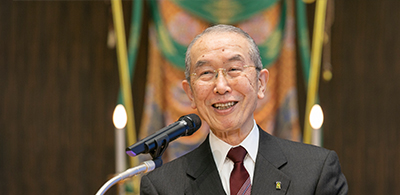Becoming Free of Worry
February 2017

All Is the Buddha’s Working
Most of us worry about a variety of things as we lead our lives. It seems that we are often swayed by things we need not worry about or things there is no use to worry about, letting ourselves experience anxiety and suffering. In your daily life, do you sometimes feel irritated to be twisted around by other people’s opinions of you or by their gossiping, or is your mind clouded by worrying about things that have not yet come to pass?
In any case, there are some people who seem to be completely indifferent to such concerns. For example, there are the carefree, generous images of Ikkyu Sojun (1394–1481) and Ryokan (1758–1831), who were Japanese Zen priests well known for their antics and profound poetry. As far as we know from anecdotes about them, they never cared about or fretted over people speaking ill of them, and they are thought to have led an enviable lifestyle, free from worrying.
Let us consider where the difference lies between us and these two men. What first comes to mind is that they were not preoccupied with worldly values, such as fame and fortune. We, however, end up comparing our reputations with those of other people in terms of status and worldly values, and are even apt to make decisions based on what we suppose we will lose or gain in those regards.
Buddhism, however, teaches us that everyone we encounter and everything that happens around us has been brought to us by the Buddha in order to teach us something important. When we accept ordinary situations as they are, there is no longer a question of superiority or inferiority, no thought of rank, and no further worry about loss or gain. Therefore, we should not overly concern ourselves about such things.
After all, in the eyes of Ikkyu and Ryokan, everything is something to be grateful for, isn’t that the case?
No Need for Worries
Furthermore, we suffer from worrying about things that we ourselves cannot change. For instance, I mentioned above the gossip of others and feelings of uncertainty about the future, but no matter how much you worry about such things, there is nothing you can do about them. In other words, it is no use in engaging in such worries. Even though we may understand this, however, we still suffer from worrying about many things, and as a result, we take on anxiety and dissatisfaction and suffer even more.
In the old Japanese television animation series Ikkyu-san, the main character Ikkyu (inspired by Ikkyu Sojun as a boy novice at a Zen temple), would always say, when some problem occurred around him, “Don’t worry about it, don’t worry about it,” or “Don’t panic, don’t panic; take it easy, take it easy.” In doing this, he tactfully switched his frame of mind. I have already introduced you, in one of the earlier installments in this series, to one method of calming down rising anger by chanting a phrase emulating a Shingon-style dharani, Om nikoniko haratatsumaizoya svaha, which means “Smile and do not lose your temper. May it be so.” So when you feel a mounting sense of anxiety or dissatisfaction, why not try making up your own chant, like the animation character Ikkyu did? That will help to blow away the clouds of anxiety and dissatisfaction that are rising up in your mind. Another way to change your mood is to take a walk. By simply going for a leisurely stroll, you can distance yourself from needless worry.
While temporarily switching your frame of mind in these ways, if you can change fundamentally and become someone who does not needlessly worry about things, just like Ikkyu and Ryokan, then you will be able to lead your life with peace of mind. Fortunately, all of you who are reading this article have a connection to the same teaching of the Buddha that these two men pursued. You will naturally become a person who never worries unnecessarily about things by studying repeatedly the basics of Buddhism—“all things are impermanent,” “all things are devoid of a separate self,” “all phenomena are characterized by suffering”—while also learning repeatedly to see things from the perspective that everything is the working of the Buddha and to perform sincere self-reflection.
Incidentally, although we do worry about things there is no use to worry about, we tend to forget about the things that we should always be keeping in mind. One of those things is the present moment. Instead of brooding over the past or the future, we should be living by treasuring the moment. Then, I hope, we will continue our practice, every day, of being considerate of other people.
On the fifteenth of this month we observe the anniversary of Shakyamuni’s entering nirvana. “Nirvana” means liberation from all ties. When we are free of ties and are leading lives that show consideration for others, we are promising that our lives will be free and bright.
Back Number



